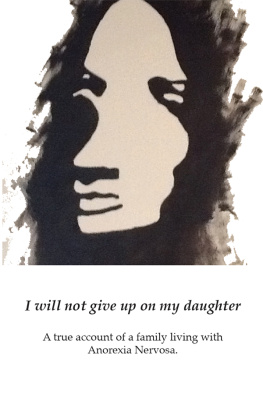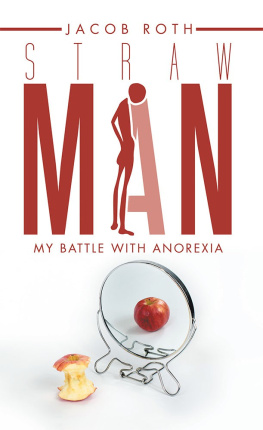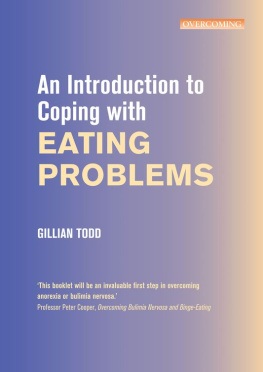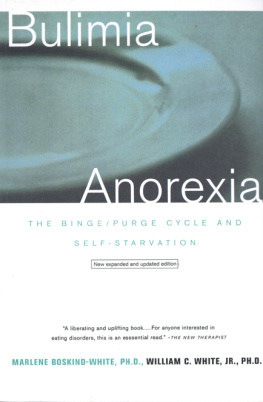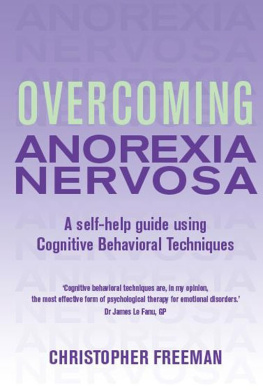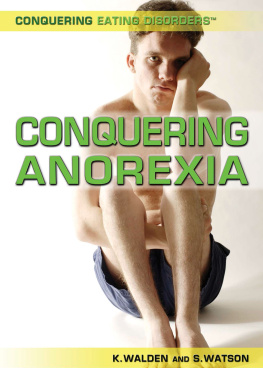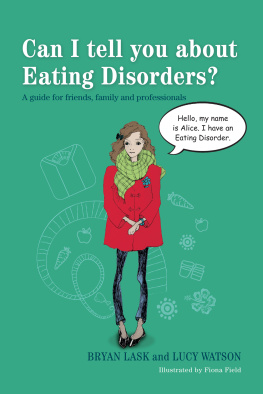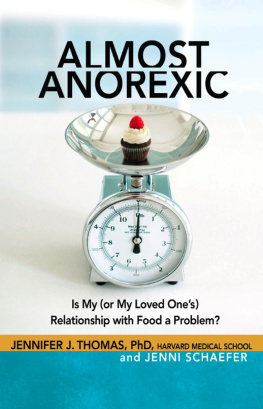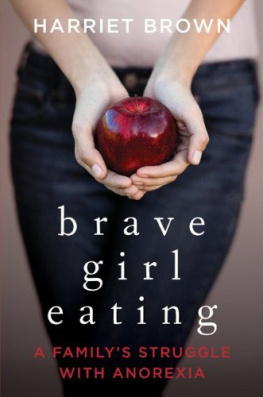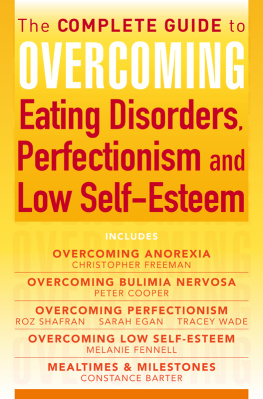I will not give up on my
Daughter
A true account of a
family living with
Anorexia Nervosa.
All names have been changed for privacy.
All events are true and based around a 13 year old girl named Summer who developsAnorexia Nervosa.
All members of the family have contributed to the writings.
Weights have been omitted for the benefit of Summer and for those who may find the facts triggering.
I will not give up on my daughter:
A true account of a family living with Anorexia Nervosa.
This edition published 2013
1. Mental health 2. Anorexia Nervosa 3. Patients 4. Auto Biography 5.Family 6. Self Help
This work is copyright.
All rights reserved.
No part of this publication may be reproduced, stored in a retrieval system, or transmitted, in any form or by any means, without the prior permission in writing of the publisher, nor be otherwise circulated in any form of binding or cover other than in which it is published and without similar condition including this condition being imposed on the subsequent purchaser.
Disclaimer
While every care has been taken in researching and compiling the information in this book, it is in no way intended to replace professional medical, legal advice and counselling. Readers are encouraged to seek such help as they deem necessary. The authors and publisher specifically disclaim any liability arising from the application of information in this book.
ISBN 978-0-9923531-1-7 (ebk)
All drawings, photographs and poems were submitted by the family.
There are no pictures of the family involved.
Printed and bound in Australia by Digital Creative Services.
Contents
I Wish to Acknowledge
I thank all of you who prayed for Summer and my family. I thank those who made us dinners in readiness for when we came home late from the hospital on Monday evenings. I thank my family for phoning me just to say hello and to see how things were going. I thank my friends who sent thinking of you cards and flowers. I thank my children Mia and James for accepting this challenging time and trusting that Derek and I were taking care of Summer. I also thank my gorgeous two children for continuing to love Summer even when she was at her most aggressive and destructive stage.
I thank my husband Derek for giving me hugs when I clearly looked like I needed them and although he was as confused and hurting as much as me, he didnt give up and continued to find new ways or different tactics to defeat Anna.
I thank the professional team who supported us and still do, to this day from Westmead Childrens Hospital, particularly the kind and hard working Annaleise Robertson and Dr Sloane Madden.
Last, but certainly not least, I thank Summer for being a brave little girl who continues to take on the devil.
Grace X
Resources
Maudsley Family Therapy, also known as Family Based Treatment provides family therapy for the treatment of Anorexia Nervosa. It was devised by Christopher Dare and colleagues at the Maudsley Hospital in London in 1985. It is a proven treatment that is most effective in assisting patients under 18 and within 3 years of the onset of their illness.
The Maudsley approach does not view the family at fault, in fact they work with you as a family group believing that there is no better place for the child than to be home having the love and family support required to get well.
There are three phases involved in the Maudsley method.
* Weight restoration.
* Returning control over eating back to the adolescent.
* Establishing a healthy adolescent identity.
The treatment usually lasts one year and involves between 15 20 therapy sessions. This approach can mostly be construed as an intensive outpatient treatment where parents play an active and positive role.
Contact:
Westmead Childrens Hospital, Sydney, Australia
Adolescent Medicine
Phone: (02) 9845 2446
Extra Resources
The Butterfly Foundation
www.thebutterflyfoundation.org.au
Eating Disorders Association in your state.
NSW www.edf.org.au
VIC www.eatingdisorders.org.au
QLD www.eda.org.au
SA www.communitywebs.org
NT Association for Mental Health - (08) 8981 4128
WA Eating Disorders Alliance - www.carersw.asn.au
TAS www.tas.eatingdisorders.org.au
Reachout: www.reachout.com.au
For outside Australia, links can be easily found to Eating Dissorder Associations, Blogs, facebook support pages and information by completing an online search.
Please also consider seeking assistance from your Doctor or Paediatrician.
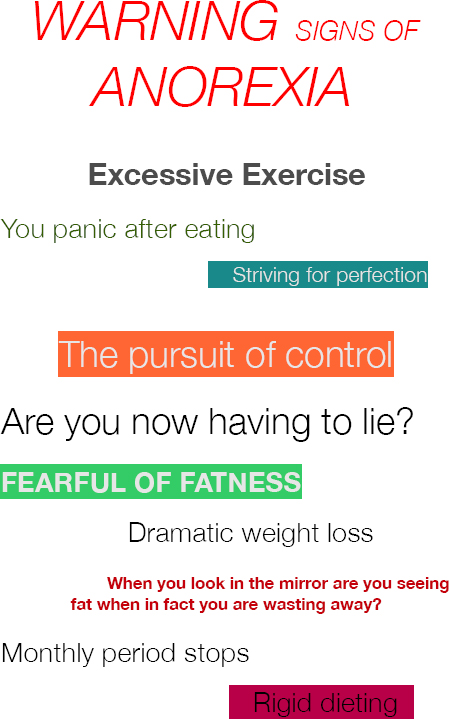
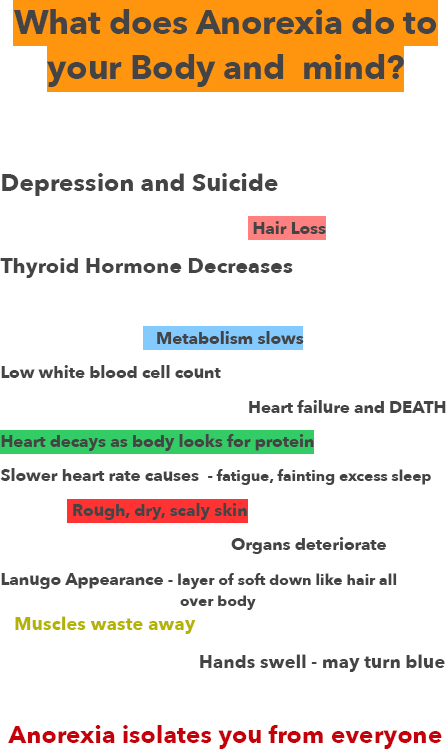
Introduction by Babs Helleman
Babs is Head of English at The Kings School in Parramatta, NSW, and a published author of a number of Secondary English textbooks.
This book reflects the reality for both the daughter, Summer and the family, who live through what can only be described as hell for a period of 9 months.
It is designed to help families understand how invasive the disease of Anorexia Nervosa is and how the balance between a normal, healthy life can be very fragile. Through reading Graces diary accounts and Summers poetic responses it is hoped that every reader will gain an insight into this disease - one that is often hidden from the public eye.
It is ironic that both the sufferer and the family see a degree of shame associated with this disease, perhaps best captured in Graces entry of October 8th when she expresses that if it was cancer the family could fight the battle together. It is clear, that whilst the family, with unconditional love can help, ultimately it is only Summer who can and must fight the demon in order to recover. This is why the disease is so hard for the family, who in many respects remain powerless. All logic and beliefs are challenged; all the instilled values are flaunted as the sufferer becomes consumed by an inner demon, in this text, thoughtfully named Anna to represent Anorexia.
The title of this text I will not give up on my daughter is an important mantra that gives strength to Grace and ultimately Summer. Graces diary entries are real as is Summers poetry. Both reflect their inner turmoil and determination, yet also reveal the devastating impact of Anorexia on the individual and the family. They capture their inner thoughts at significant times as each tries to fight the disease in particularly distinct ways.
This book is essential reading, not only for the families affected but for all teenage girls and boys. The public perception is that it is a girls disease but this is not the case. Dr Mark Warren from the Cleveland Centre for Eating Disorders states:
ED in men was thought to be almost non-existent, in the 80s and 90s about 10% and now 25-30%. So all we know is that it is more prevalent than was previously thought. In addition, boys engage in some behaviour unusual for girls- including steroid use, spitting, and over the counter muscle enhancers. If we include these behaviours, the prevalence of ED in boys may be even higher.
I hope this book will be read widely and taught in secondary schools as part of the Personal, Health & Development programme. It also has a place in the English classroom.
Its not the difficulties of life
that defines you,
You cant help that.

